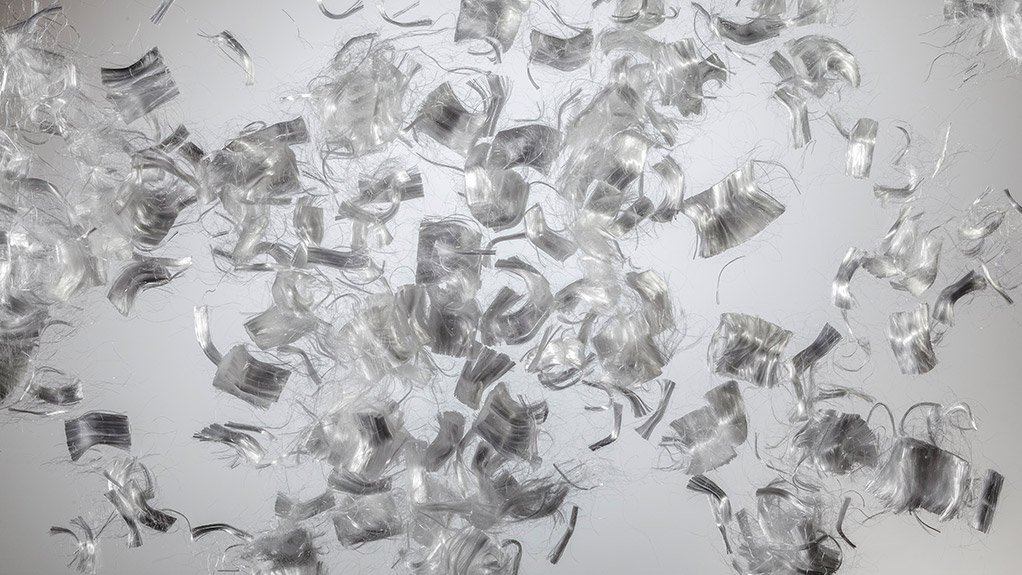More Fire Protection For Concrete With Adfil Fibres From Chryso
This article has been supplied as a media statement and is not written by Creamer Media. It may be available only for a limited time on this website.
The recent Knysna wildfires and building fires in Johannesburg, as well as mine fires underground, are a reminder of the value of specialised construction materials in passive fire protection, especially in reducing explosive spalling.
Such a solution is the specially designed Adfil IGNIS® monofilament polypropylene fibres, distributed locally by CHRYSO Southern Africa, leading supplier of concrete and cement admixtures and ancillary products.
Developed by Adfil Construction Fibres, a division of the UK-based Low & Bonar Group, the IGNIS fibres have been used in concrete mixes to enhance the fire rating of concrete structures and have been successfully applied in tunnels, sprayed linings, precast segments and pumped concrete behind slip-formed shuttering.
In a move that will bring this innovated technology closer to home, Adfil recently appointed CHRYSO Southern Africa as its partner to grow its fibre business into Africa. There will also be collaboration between Adfil and specialist South African company Oxyfibre, which has developed patented surface technologies and nano-technologies for polypropylene fibres; it has also treated and supplied fibres to CHRYSO Southern Africa for almost two decades.
According to Izak Louw, operations manager at Oxyfibre, fire can cause explosive spalling in concrete structures when ‘free water’ in the concrete pores – water that has not been consumed during the hydration reaction and remains unused in the concrete – becomes steam when exposed to fire and causes explosions that break up the concrete.
“Falling concrete then presents a serious safety risk, and the integrity of the concrete structure is also compromised,” says Louw.
To enhance the fire rating of concrete structures and reduce the risk of spalling, Adfil’s polypropylene fibres are added to the concrete mix for the purpose of increasing permeability during heating, thus reducing pore pressures.
“In the case of fire, the fibres will start to melt when the heat of the concrete is approximately 160°C,” he says. “When the temperature reaches 360°C, the fibres will disintegrate to provide millions of capillaries in the concrete for the moisture to escape. The result of using these fibres in concrete is that there is no build-up of pressure and hence no explosive spalling.”
According to Louw, there is substantial scope in South Africa and in Africa more broadly for the use of specialised fibres in concrete as passive fire protection, as it can prevent the catastrophic failure of concrete structures – from mine tunnels to high-rise buildings.
“Furthermore, polypropylene fibres offer a three-dimensional system, which helps to prevent shrinkage cracks from occurring,” he says. “The fibres increase the tensile strain capacity of the mix at the plastic stage, while crack control reinforcement would merely hold the cracks together once the concrete has failed.”
Proven at such test facilities as TNO in Holland and the BRE in England, Adfil IGNIS® has been used in many road tunnels, primarily to avoid the potential collapse of these structures in the event of serious fires.
Comments
Announcements
What's On
Subscribe to improve your user experience...
Option 1 (equivalent of R125 a month):
Receive a weekly copy of Creamer Media's Engineering News & Mining Weekly magazine
(print copy for those in South Africa and e-magazine for those outside of South Africa)
Receive daily email newsletters
Access to full search results
Access archive of magazine back copies
Access to Projects in Progress
Access to ONE Research Report of your choice in PDF format
Option 2 (equivalent of R375 a month):
All benefits from Option 1
PLUS
Access to Creamer Media's Research Channel Africa for ALL Research Reports, in PDF format, on various industrial and mining sectors
including Electricity; Water; Energy Transition; Hydrogen; Roads, Rail and Ports; Coal; Gold; Platinum; Battery Metals; etc.
Already a subscriber?
Forgotten your password?
Receive weekly copy of Creamer Media's Engineering News & Mining Weekly magazine (print copy for those in South Africa and e-magazine for those outside of South Africa)
➕
Recieve daily email newsletters
➕
Access to full search results
➕
Access archive of magazine back copies
➕
Access to Projects in Progress
➕
Access to ONE Research Report of your choice in PDF format
RESEARCH CHANNEL AFRICA
R4500 (equivalent of R375 a month)
SUBSCRIBEAll benefits from Option 1
➕
Access to Creamer Media's Research Channel Africa for ALL Research Reports on various industrial and mining sectors, in PDF format, including on:
Electricity
➕
Water
➕
Energy Transition
➕
Hydrogen
➕
Roads, Rail and Ports
➕
Coal
➕
Gold
➕
Platinum
➕
Battery Metals
➕
etc.
Receive all benefits from Option 1 or Option 2 delivered to numerous people at your company
➕
Multiple User names and Passwords for simultaneous log-ins
➕
Intranet integration access to all in your organisation























